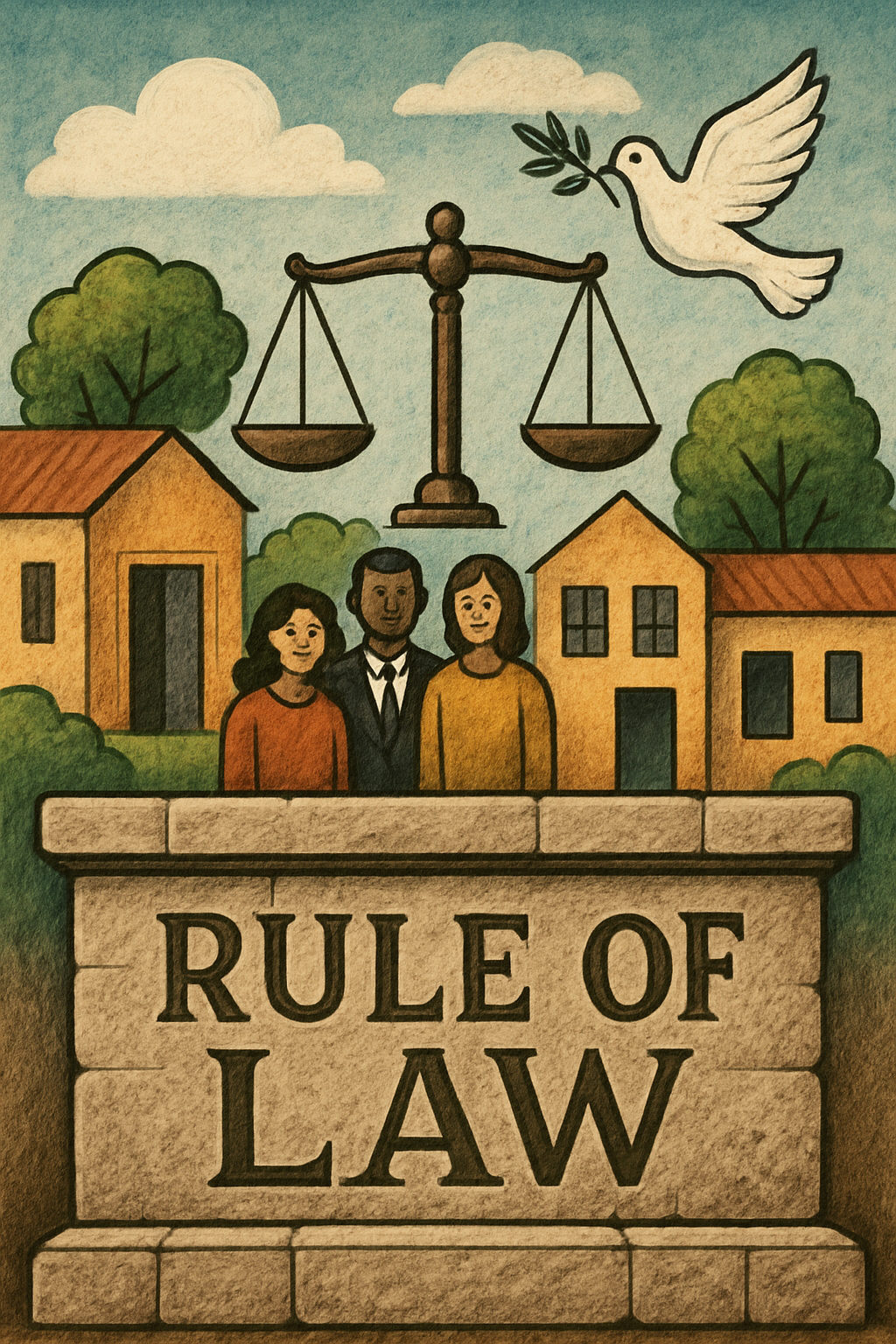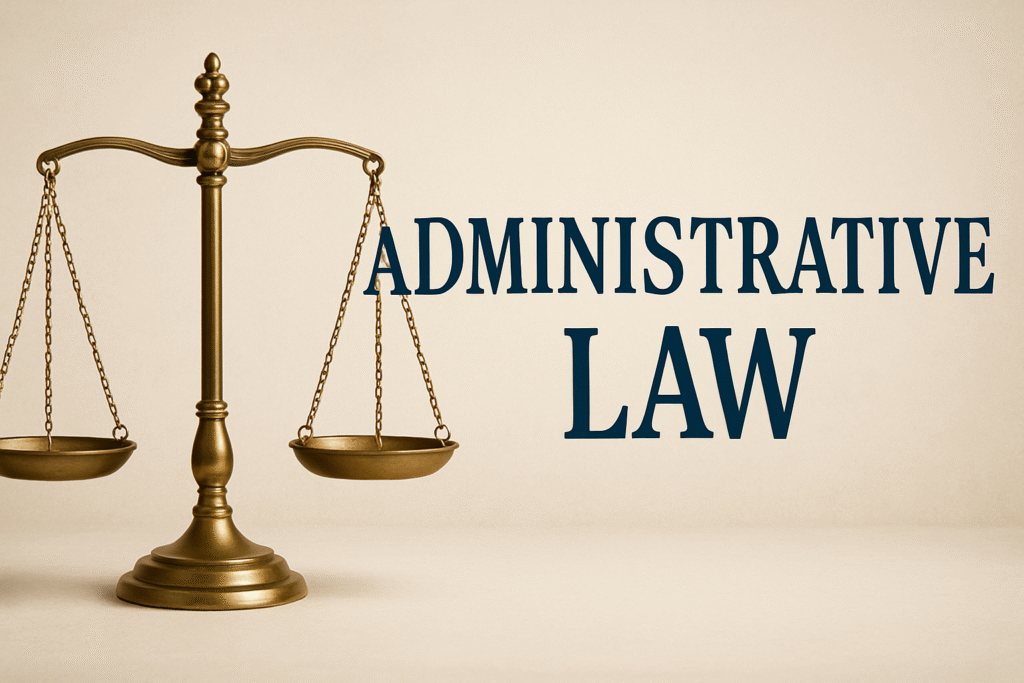Natural Justice:
1. Abstract:
Natural justice is a cornerstone of administrative law in Bharat, ensuring fairness, equity, and impartiality in decision-making processes.[1] Rooted in the principles of fair hearing and unbiased judgment, it safeguards individuals against arbitrary actions by authorities. This seminar paper explores the concept of natural justice, its key principles, and its application in Bharat’s legal framework, with reference to landmark judicial pronouncements and constitutional provisions. The paper highlights the significance of natural justice in upholding justice and public trust in governance.
2. Introduction:
Natural justice is a fundamental concept in Bharat’s legal system, ensuring that decisions made by authorities are fair, transparent, and just. It is not just a legal requirement but a moral obligation that protects individuals from arbitrary or unfair actions by the state or its agencies.[2] In Bharat, natural justice is deeply embedded in administrative law[3] and is upheld by the judiciary through constitutional provisions and case laws. This paper discusses the meaning of natural justice, its two core principles, firstly audi alteram partem i.e. right to a fair hearing and secondly nemo judex in causa sua i.e. rule against bias and their application in Bharat’s jurisprudence.
3. Meaning of Natural Justice
Natural justice refers to the basic principles of fairness that must guide any decision-making process, especially when it affects an individual’s rights or interests. It is not defined in any statute but is a common-law principle that ensures justice is delivered in a manner that is fair and impartial.[4] In Bharat, natural justice is considered an essential part of the rule of law, which is a foundational value of the Constitution.[5] It applies to administrative, quasi-judicial, and judicial actions, ensuring that no one is unfairly treated by those in authority.
4. Core Principles of Natural Justice
Natural justice rests on two primary principles: the right to a fair hearing and the rule against bias.[6] These principles are vital to ensuring fairness in decision-making.
4.1 Audi Alteram Partem (Right to a Fair Hearing):
This principle means “hear the other side.” It requires that every person affected by a decision must be given a fair opportunity to present their case before a decision is made. This includes:
Notice: The person must be informed about the charges or issues against them. The notice should be clear and provide enough time to prepare a response.[7]
Opportunity to Respond: The person must be allowed to present their side, submit evidence, and argue their case.[8]
Reasoned Decision: The authority must provide reasons for its decision, showing that it considered the person’s arguments.[9]
In Bharat, this principle is strictly enforced. For example, in the case of Maneka Gandhi v. Union of India,[10] the Supreme Court held that the government’s decision to impound a passport without giving the petitioner a chance to be heard violated natural justice. The court emphasized that even administrative actions must follow fair procedures.
4.2 Nemo Judex in Causa Sua (Rule Against Bias):
This principle means “no one should be a judge in their own cause.” It ensures that the decision-maker is impartial and has no personal interest in the case. Bias can be:
Personal Bias: When the decision-maker has a personal connection with the parties involved.
Pecuniary Bias: When the decision-maker has a financial interest in the outcome.
Official Bias: When the decision-maker is too closely associated with the issue to remain impartial.
In A.K. Kraipak v. Union of India,[11] the Supreme Court ruled that a selection committee member who was also a candidate for the same position violated the rule against bias. The court stressed that even a slight possibility of bias is enough to invalidate a decision.
5. Natural Justice in Bharat’s Constitutional Framework:
The Constitution of Bharat does not explicitly mention natural justice, but its principles are embedded in several provisions, particularly under Articles 14, 19, and 21.[12] These articles guarantee equality, freedom, and the right to life and personal liberty, respectively.
Article 14 (Right to Equality): Ensures that all actions by the state are fair and non-arbitrary. Natural justice prevents discriminatory or biased decisions, aligning with this article.
Article 19 (Right to Freedom): Protects freedoms like speech and expression, which include the right to a fair hearing when these freedoms are restricted.
Article 21 (Right to Life and Liberty): Requires that any deprivation of life or liberty must follow a fair procedure. The Supreme Court in Maneka Gandhi v. Union of India expanded this to include natural justice as part of due process.
The judiciary has played a crucial role in ensuring that natural justice is applied in both judicial and administrative actions. Courts have consistently struck down decisions that violate these principles, reinforcing their importance in Bharat’s legal system.
6. Application in Administrative Law:
In Bharat, natural justice applies to administrative actions, such as decisions by government officials, tribunals, and statutory authorities. For instance:
Disciplinary Proceedings: In cases involving government employees, natural justice ensures they receive a fair hearing before actions like dismissal or suspension. In State of Orissa v. Binapani Dei, the Supreme Court held that retiring an employee without a hearing violated natural justice.[13]
Licensing and Permits: Authorities must follow natural justice when granting or revoking licenses. For example, in Ernakulam District Private Bus Operators’ Association v. State of Kerala, the court ruled that canceling a bus permit without a hearing was unlawful.[14]
Tribunals and Quasi-Judicial Bodies: Tribunals, such as those under the Income Tax Act or labor laws, must adhere to natural justice to ensure fair adjudication.
7. Exceptions to Natural Justice
While natural justice is a fundamental principle, there are limited situations where it may not apply. These include:
Emergency Situations: In cases of immediate public safety or national security, authorities may act without a hearing. However, courts require that such actions be justified.
Statutory Exclusions: Some laws explicitly exclude natural justice, but courts review such exclusions strictly to ensure they are reasonable.
Administrative Actions: Purely administrative decisions, like policy-making, may not require a hearing, but courts still ensure they are not arbitrary.
In S.L. Kapoor v. Jagmohan, the Supreme Court clarified that excluding natural justice must be justified and cannot be done arbitrarily.[15]
8. Challenges in Implementing Natural Justice
Despite its importance, applying natural justice in Bharat faces challenges:
Delay in Processes: Providing a fair hearing can sometimes slow down administrative actions, leading to delays in justice delivery.
Lack of Awareness: Many citizens are unaware of their right to natural justice, limiting their ability to challenge unfair decisions.
Bureaucratic Resistance: Some authorities resist following natural justice due to inefficiency or bias, requiring judicial intervention.
The judiciary has addressed these challenges by expanding the scope of natural justice and ensuring strict compliance through writ petitions under Articles 32 and 226 of the Constitution.
9. Conclusion
Natural justice is a vital principle in Bharat’s legal system, ensuring that decisions affecting individuals are made fairly and impartially. The principles of audi alteram partem and nemo judex in causa sua form the backbone of this concept, safeguarding citizens against arbitrary actions. Through landmark cases like Maneka Gandhi v. Union of India and A.K. Kraipak v. Union of India, the judiciary has strengthened the application of natural justice in administrative law. While challenges remain, the commitment of Bharat’s courts to uphold these principles ensures that justice remains accessible and fair for all.
References:
[1] Principles of Natural Justice: Definition, Application to Administrative Proceedings and Contours of Application by Rimali Batra and Col Rajeev Anand (Retd), available at https://www.scconline.com/blog/post/2025/04/22/principles-of-natural-justice-application-scope-administrative-proceedings/, Last visited on 8.8.2025
[2] Satender Kumar Antil vs. Central Bureau of Investigation & Another, [2022 (10) SCC 51]
[3] Principles of Natural Justice, Justice Brijesh Kumar, J.T.R.I. JOURNAL – First Year, Issue – 3 – Year – July – September, 1995
[4] What is the Rule of Law?, World Justice Project, available at https://worldjusticeproject.org/about-us/overview/what-rule-law, Last visited on 8.8.2025
[5] Kailash Suneja v. Appropriate Authority [[1998]231ITR318(DELHI)]
[6] Principles of Natural Justice: Meaning & the 3 Principles – UPSC Notes, Testbook, available at https://testbook.com/ias-preparation/principles-of-natural-justice#:~:text=The%20Principles%20of%20natural%20justice,decisions%20are%20based%20on%20reasoning., Last visited on 8.8.2025
[7] Evidence Act, Judicial Training and Research Institute, UP
[8] Brij Bhukan Kalwar And Ors. vs S.D.O. Siwan And Ors. [AIR1955PAT1]
[9] Dr. Balbir Singh And Ors. Etc. Etc vs Municipal Corporation, Delhi And Ors [1986 AIR 345]
[10] Maneka Gandhi v. Union of India, [AIR 1978 SC 597]
[11] A.K. Kraipak v. Union of India, [AIR 1970 SUPREME COURT 150]
[12] H. H. Maharajadhiraja Madhav Rao Jiwaji vs Union Of India [AIR 1971 SUPREME COURT 530]
[13] State of Orissa v. Binapani Dei, 1967 2 SCJ 339
[14] Ernakulam District Private Bus Operators’ Association v. State of Kerala [(2006) 09 KL CK 0048]
[15] S.L. Kapoor v. Jagmohan, [1981 SCR (1) 746]




![ADMINISTRATIVE LAW By Dr. J.J.Ram Upadhyay [ Edition 2020-2021]](https://m.media-amazon.com/images/I/31a-7lPaIDL._SY445_SX342_.jpg)

Pingback: Administrative Delegation: A Key to Efficient Governance – bharatlex-rinkutai.com
Pingback: Understanding Administrative Authority in Bharat: Key Doctrines and Supreme Court Judgments – bharatlex-rinkutai.com